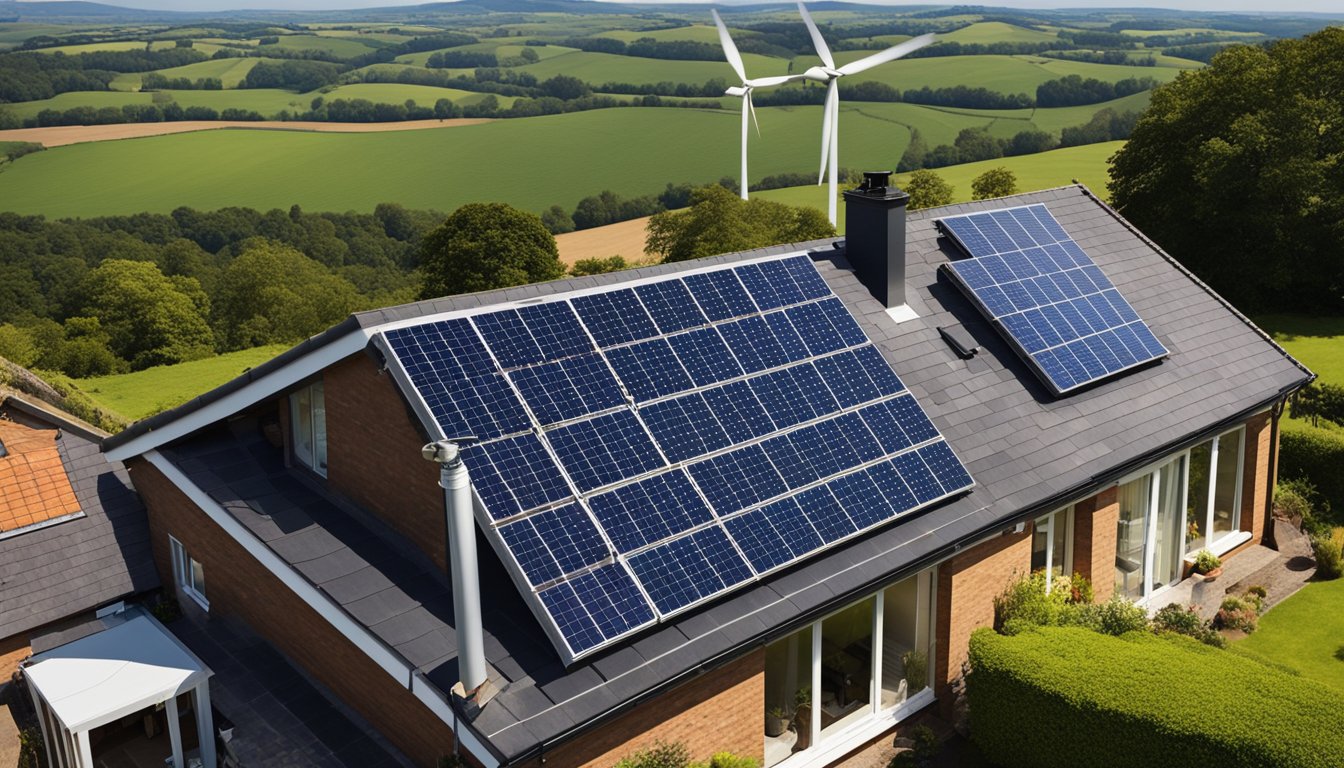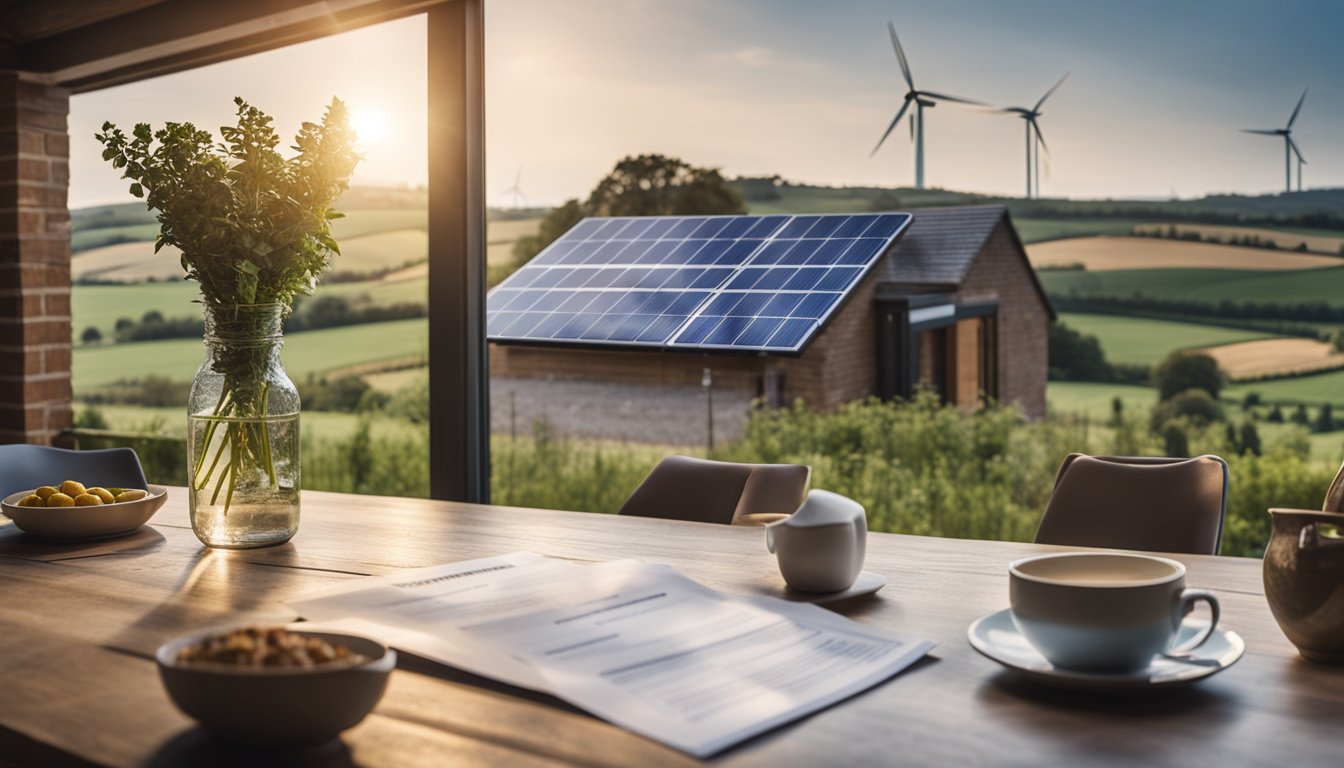Late updated: 29 Sep 2024 13:09
Written by: Oliver Bennett
Renewable Energy Grants For Rural UK Homeowners: Financial Support Overview
Exploring renewable energy options for rural homeowners in the UK opens the door to numerous financial benefits. Government grants are available to support energy efficiency measures and low carbon heating systems, particularly for those in off-grid or low-income households. These financial incentives not only make it feasible to transition to sustainable energy solutions but also help reduce long-term energy costs.

With several grants on offer, it’s crucial for homeowners to understand the application process and eligibility requirements. For instance, the Warm Homes: Local Grant in England will soon provide energy performance upgrades, making it an attractive option for low-income households. Additionally, Scotland provides significant funding through its Warmer Homes Scheme, aiding residents in rural and island areas. These grants serve as tangible support toward energy-efficient home improvements.
Our focus is to empower homeowners to take advantage of these grants and embrace renewable energy solutions. By doing so, we contribute to a greener future and encourage smart, sustainable living. Understanding the options and taking decisive action will help us lead the way in adopting renewable energy practices.
Key Takeaways
- Government grants support rural UK homeowners with energy efficiency.
- Understanding eligibility is crucial for accessing available funding.
- Renewable energy solutions lower long-term costs and benefit the environment.
Understanding Renewable Energy Grants

Renewable energy grants for rural UK homeowners cover various funding opportunities designed to improve energy efficiency and encourage the adoption of low-carbon technologies. These grants often target specific groups such as low-income households or properties lacking energy-efficient installations.
Eligibility Criteria for Grants
Eligibility for renewable energy grants often depends on several factors. The Energy Company Obligation (ECO) is one such scheme that targets low-income households, aiming to alleviate fuel poverty by funding energy-efficient home upgrades. Income-related benefits such as income support, universal credit, and pension credit can qualify homeowners for these grants.
Other programs may consider the EPC rating of a home. Properties with lower EPC ratings, indicating less energy efficiency, might be prioritised for funding. Specific schemes like the Boiler Upgrade Scheme or Home Upgrade Grant target rural homes that are off the gas grid. These criteria ensure that the aid reaches those in greatest need and have the most impact on energy efficiency.
Types of Grants Available
Several grants offer assistance to rural homeowners in the UK. The Home Upgrade Grant focuses on energy efficiency measures for homes not connected to the gas grid. Meanwhile, the Warmer Homes Scotland initiative provides support for insulation, heating, and other energy-efficient improvements.
The Energy Company Obligation (ECO) scheme, funded by major energy suppliers, facilitates the installation of efficient boilers and insulation. The Great British Insulation Scheme is another key programme aimed at improving home insulation. Homeowners can also consider the Home Energy Scotland Grant and Loan Scheme which combines grants and low-interest loans for more extensive home energy improvements. These diverse options ensure that rural homeowners can effectively enhance their energy efficiency and reduce carbon footprints.
Implementing Energy Efficiency Measures
In rural UK homes, enhancing energy efficiency is essential for reducing energy bills and increasing comfort. We explore various practical measures, from improving insulation to upgrading heating systems, all aimed at making homes more sustainable.
Insulation and Glazing Solutions
Proper insulation is crucial for maintaining warmth and reducing energy costs. Loft insulation and solid wall insulation are effective ways to prevent heat loss. Loft insulation can significantly minimise energy usage, especially in older homes where heat escapes easily.
Additionally, draught-proofing doors and windows is a cost-effective and straightforward method. Opting for double glazing on windows further enhances the home’s ability to retain heat. In island homes, where weather conditions can be more severe, these measures are particularly beneficial. Implementing such solutions not only improves thermal efficiency but also contributes to environmental conservation by reducing carbon footprints.
Heating System Upgrades
For many rural homes, upgrading the heating system can lead to substantial energy savings. Heat pumps represent a modern and efficient choice, offering an alternative to traditional heating methods. They extract heat from the air or ground, delivering energy-efficient warmth. Utilising clean heating systems like heat pumps can cut down on energy expenses significantly.
Boiler upgrades, including the installation of energy-efficient boilers, may also be worthwhile. Incorporating heating controls allows homeowners to manage energy usage better. Systems that let us programme heating based on daily routines can provide both comfort and savings, proving their worth especially in colder months.
Renewable Energy Installations
Adopting renewable energy sources is a proactive way for rural homeowners to cut energy costs. Installing solar panels enables us to generate electricity independently, reducing reliance on grid power and lowering utility bills. They work excellently in areas with substantial sunlight exposure, providing a sustainable power source.
Some homeowners may consider utilising Home Energy Scotland loans to finance these installations, making upfront costs more manageable. Integrating these renewable solutions not only adds value to our homes but also aligns with broader environmental goals. Through thoughtful investments in renewable technologies, rural homeowners can enjoy increased energy autonomy and resilience.
Frequently Asked Questions

Navigating the landscape of renewable energy grants for rural UK homeowners can be challenging. We address common queries about eligibility, available subsidies, and application processes.
Who is eligible for government energy grants for rural UK homeowners in 2024?
In 2024, households in rural UK areas can take advantage of energy grants focusing on low-income and off-grid residences. Eligibility often depends on both the property's energy efficiency rating and household income.
What subsidies are available for installing free solar panels on rural UK properties?
Subsidies for installing solar panels include government schemes and local council initiatives. These financial aids often aim to reduce installation costs, making renewable energy accessible for rural homeowners. It's crucial to verify the specific criteria with local authorities.
How can homeowners in rural areas of the UK apply for renewable energy grants?
Rural homeowners can apply for renewable energy grants through online government portals or by consulting local energy advisors. Detailed documentation proving eligibility is typically required for a successful application process.
Are there specific government grants available for window upgrades in UK rural homes?
Government grants for window upgrades are often part of broader energy efficiency programmes. These initiatives aim to replace outdated windows with energy-efficient alternatives, reducing heat loss and improving overall home efficiency.
What government initiatives exist for solar battery storage for rural homeowners in the UK?
Government initiatives for solar battery storage include financial incentives to enhance energy independence. These programmes typically focus on integrating storage solutions with existing solar panels, maximising energy efficiency.
Following the closure of the Green Homes Grant, what schemes are now available to support home energy efficiency in England?
After the Green Homes Grant ended, schemes such as the Home Upgrade Grant and the Boiler Upgrade Scheme emerged. These initiatives address home energy efficiency, offering financial support for upgrades like heat pumps and improved insulation.
